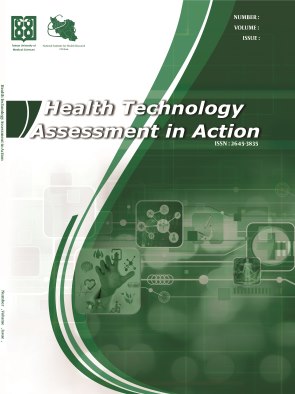Evaluation of Professors' Satisfaction with Short-Term Course of Medical Education in Birjand University of Medical Sciences During Covid-19 Pandemic
Abstract
Background: The aim of this study was to investigate the satisfaction of professors with the short-term course (fellowship) of medical education in Birjand University of Medical Sciences in the Covid 19 pandemic. The results of this study can be used to plan training courses in person and virtually in post-Corona era.
Methods: Initially, needs assessment was conducted for the content of the course, after determining the content, the course was held online through Adobe Connect system and offline through Navid system. Following completing the course, evaluation was done and finally satisfaction with the course assessed based on the questionnaire of 34 items confirmed validity and reliability. The data were analyzed by SPSS software version 18 , using t-test and correlation coefficient.
Results: The mean age of participants was 36.34 with a standard deviation of 5.64 years, 56.8% (25 people) were female and 43.2% (19 people) were male. In terms of academic rank, 75% were assistant professors. The average score of satisfaction is equal to 140.48, which indicates a high score of satisfaction with the course. Also, in general, the score of satisfaction is higher than average, in all fields. The average score of satisfaction in men is significantly lower than women. There was no significant relationship between degree, academic rank, age and work experience with satisfaction.
Conclusion: Totally, professors' satisfaction with the online and offline medical education fellowship course in the relevant systems is at a high level, so it is suggested that in the post-corona era, combined empowerment courses in person and online should be held.
2. Avijgan M, Karamalian H, Ashourioun V, Changiz T. Educationalneeds assessment of medical school’s clinical faculty members in Isfahan University of Medical Sciences. Iran J Med Educ. 2009;9(2):93-103.
3. Safavi A, Sadeghi A. Reconstructing Academic Staff Development Program: by Implementing a Supervised and Feedback on Experience Strategy in Order to Improve Their Teaching Skills in lesson Planning. Educ Strategy Med Sci. 2016;10(5):358-63.
4. Rahimi E, Dehghani A, Baharlou R. Faculty members’ viewpoints on their empowering factors and developing a structured questionnaire. Iran J Med Educ. 2013;13(1):29-38.
5. Steinert Y. Faculty development: from workshops to communities of practice. Med Teach. 2010;32(5):425-8.
6. Tavakoli Dastjerdi F, Neyestani M, Mirshahjafari E, Yamani N. Educational Needs Assessment of Empowerment Programs for Faculty Members of Isfahan University of Medical Sciences. Iran J Med Educ. 2017;17:471-81.
7. McLean M, Cilliers F, Van Wyk JM. Faculty development: yesterday, today and tomorrow. Med Teach. 2008;30(6):555-84.
8. Salehiniya H, Akbari N. Medical Education Fellowship, an opportunity to enhance the capabilities of faculty member. . TOP. 2021.
9. Farsi Z, Aliyari S, Ahmadi Y, Afaghi E, Sajadi SA. Satisfaction of the Quality of Education and Virtual Education during the Covid-19 Pandemic in Nursing Students of Aja University of Medical Sciences in 2020. J Mil Med. 2021;23(2):174-85.
10. Fatani TH. Student satisfaction with videoconferencing teaching quality during the COVID-19 pandemic. BMC Med Educ. 2020;20(1):396.
11. Azizi A, Alaee A, Valaii N, Amjadzadeh M, Fardinnasr A. Knowledge and satisfaction of dental students with the instruction of oral and maxillofacial medicine: Web-based instruction versus the traditional instruction. Res Dent Sci. 2017;14(1):57-62.
12. Zarif Sanaiey N, Karamizadeh Z, Faghihi AA, Mohammadi H. The comparison study of Knowledge and skill of physicians before and after contributionin traditional and electronic continuous Medical Education Diabetic course. Virtual Learn Med Sci. 2012;3(1):21-30.
13. Eslami K, Kouti L, Noori A. Different Methods of Medical Sciences Virtual Education in Iran and Assessment of their Efficacy; a Review Article. Educ Dev Judishapur. 2016;7(2):128-37.
14. Badanara marzdashty A, Emami Sigaroudi A, Kazemnezhad-Leyli E, Poursheikhian M. Compare the effect of two electronic andtraditional education methods on first principles of instruction in nursing students of Guilan University of Medical Sciences in 2016. Res Med Educ. 2018;10(1):48-55.
15. Sung YH, Kwon IG, Ryu E. Blended learning on medication administration for new nurses: integration of e-learning and face-to-face instruction in the classroom. Nurse Educ Today. 2008;28(8):943-52.
16. Sinclair PM, Kable A, Levett-Jones T, Booth D. The effectiveness of Internet-based e-learning on clinician behaviour and patient outcomes: A systematic review. Int J Nurs Stud. 2016;57:70-81.
17. Rokhafroz D, Sayadi N, Hakim A. The study of Knowledge and View of faculty members of Ahvaz Jundishapur University Of Medical Sciences with short term and long term strategies of combined e-learning. A Cross-Sectional Study. Educ Dev Judishapur. 2012;3(3):30-8.
18. Bahadorani M, Changiz T. The effectiveness of three methods of teaching medline to medical students: Online, face to face and combined educational methods. Iran J Med Educ. 2006;6(2):35-43.
| Files | ||
| Issue | Vol 5, No 2 (2021) | |
| Section | Articles | |
| DOI | https://doi.org/10.18502/htaa.v5i2.8012 | |
| Keywords | ||
| Evaluation Short Course Fellowship Birjand Satisfaction Covid 19 | ||
| Rights and permissions | |

|
This work is licensed under a Creative Commons Attribution-NonCommercial 4.0 International License. |




